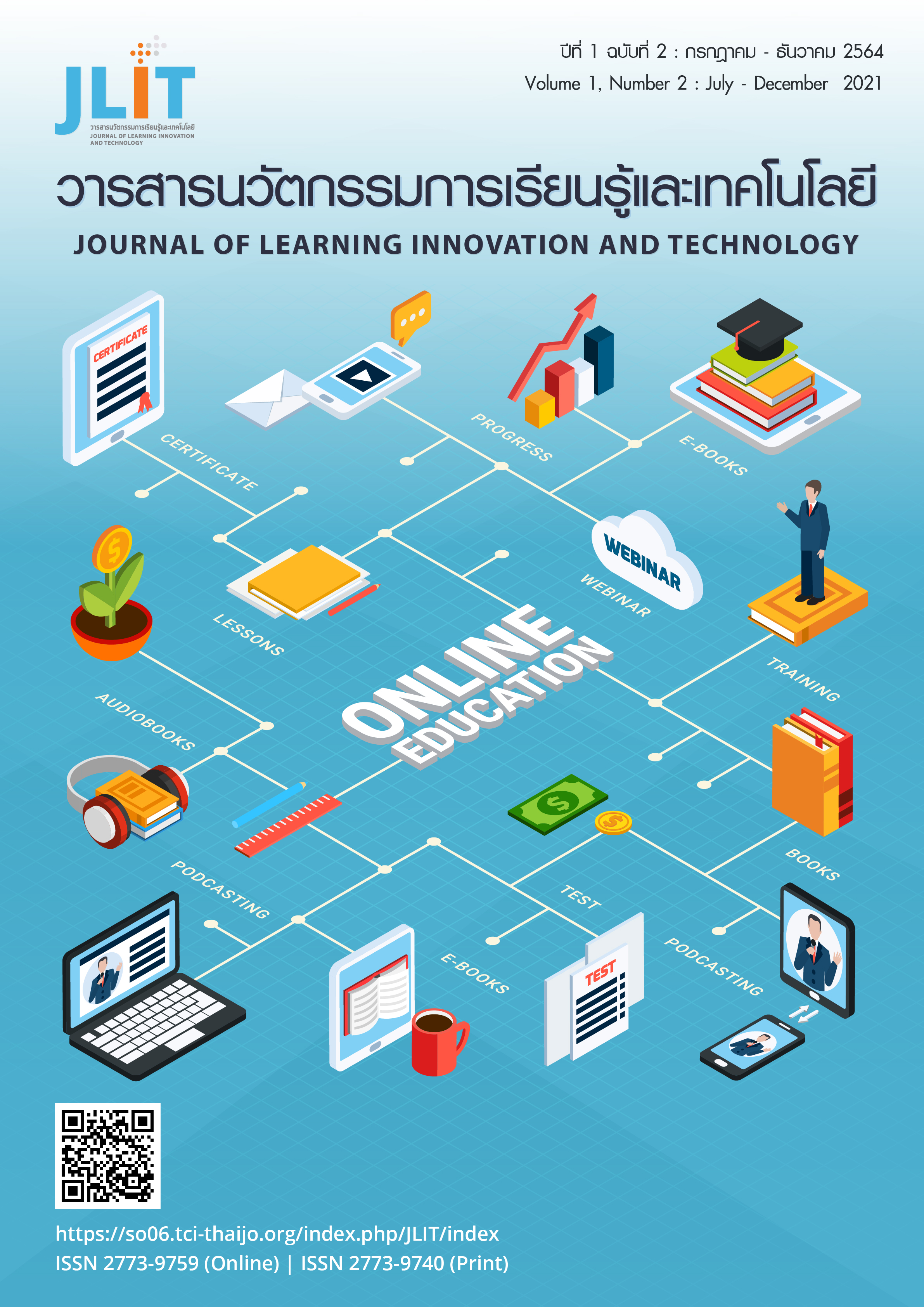การศึกษาความสามารถในการเผชิญปัญหาและการฟันฝ่าอุปสรรคของนักศึกษา ระดับปริญญาตรี คณะครุศาสตร์อุตสาหกรรมและเทคโนโลยี มหาวิทยาลัยเทคโนโลยีพระจอมเกล้าธนบุรี
คำสำคัญ:
ความสามารถในการเผชิญปัญหาและการฟันฝ่าอุปสรรค, คณะครุศาสตร์อุตสาหกรรมและเทคโนโลยี, นักศึกษาบทคัดย่อ
การวิจัยนี้มีวัตถุประสงค์เพื่อศึกษาความสามารถในการเผชิญปัญหาและการฟันฝ่าอุปสรรคและเพื่อเปรียบเทียบลักษณะทางประชากรกับความสามารถในการเผชิญปัญหาและการฟันฝ่าอุปสรรคของนักศึกษาระดับปริญญาตรี คณะครุศาสตร์อุตสาหกรรมและเทคโนโลยี มหาวิทยาลัยเทคโนโลยีพระจอมเกล้าธนบุรี ระเบียบวิธีวิจัยเป็นงานวิจัยเชิงปริมาณใช้วิธีการศึกษาเชิงสำรวจ เก็บรวบรวมข้อมูลจากกลุ่มตัวอย่าง คือ นักศึกษาระดับปริญญาตรี คณะครุศาสตร์อุตสาหกรรมและเทคโนโลยี มหาวิทยาลัยเทคโนโลยีพระจอมเกล้าธนบุรี จำนวน 305 คน สถิติที่ใช้ในการวิจัย ได้แก่ ค่าความถี่ ค่าร้อยละ ค่าเฉลี่ย ค่าเบี่ยงเบนมาตรฐาน การทดสอบ t–test การวิเคราะห์ความแปรปรวนแบบทางเดียว One-way ANOVA (F–test) และการเปรียบเทียบรายคู่เชิงพหุคูณด้วยวิธี LSD ผลการวิจัย พบว่า 1) กลุ่มตัวอย่างมีคะแนนเฉลี่ยความสามารถในการเผชิญปัญหาและการฟันฝ่าอุปสรรค โดยรวมอยู่ในระดับมาก ( = 3.79, SD = 0.45) เมื่อพิจารณาเป็นรายด้าน พบว่า ด้านที่มีค่าเฉลี่ยสูงที่สุด คือ ด้านความรับผิดชอบต่อปัญหาอยู่ในระดับมาก (
= 3.87, SD = 0.48) รองลงมาคือ ด้านความอดทน อยู่ในระดับมาก (
= 3.79, SD = 0.39) ด้านการควบคุมสถานการณ์ อยู่ในระดับมาก (
= 3.77, SD = 0.45) และด้านผลกระทบ อยู่ในระดับมาก (
= 3.71, SD = 0.42) 2) ผลการเปรียบเทียบลักษณะทางประชากรที่แตกต่างกันมีความสามารถในการเผชิญปัญหาและการฟันฝ่าอุปสรรคแตกต่างกันอย่างมีนัยสำคัญทางสถิติที่ระดับ .05 เมื่อจำแนกตามลักษณะทางประชากร พบว่า กลุ่มตัวอย่างเพศหญิงและเพศชายมีความสามารถในการเผชิญปัญหาและการฟันฝ่าอุปสรรคแตกต่างกัน กลุ่มตัวอย่างที่มีอายุแตกต่างกัน ศึกษาอยู่ในภาควิชาที่แตกต่างกัน มีอาชีพผู้ปกครองที่แตกต่างกัน และมีรายได้ครอบครัวที่แตกต่างกันมีความสามารถในการเผชิญปัญหาและการฟันฝ่าอุปสรรคแตกต่างกัน แต่ไม่พบความแตกต่างของความสามารถในการเผชิญปัญหาและการฟันฝ่าอุปสรรคในตัวแปรสถานภาพครอบครัวที่แตกต่างกัน
เอกสารอ้างอิง
โรงเรียนนายเรือ, 2558, ความหมายของ Q ทั้ง 7 ตัว คือ IQ EQ CQ MQ PQ AQ และ SQ, [ระบบออนไลน์], แหล่งที่มา http://www.rtna.ac.th/pages/7q.html, [26/11/2561].
Stoltz, P. G., 1997, “Adversity Quotient”, Turning obstacles into opportunities, John Wiley & Son Inc., New York.
มหาวิทยาลัยเทคโนโลยีพระจอมเกล้าธนบุรี คณะครุศาสตร์อุตสาหกรรมและเทคโนโลยี, 2562, แผนกลยุทธ์ฉบับที่ 12, [ระบบออนไลน์], แหล่งที่มา http://www.fiet.kmutt.ac.th/home/index.php/about-faculty/--12, เข้าดูเมื่อวันที่ 19/12/2562.
มหาวิทยาลัยเทคโนโลยีพระจอมเกล้าธนบุรี, 2562, สถิตินักศึกษาปัจจุบันที่ลงทะเบียนเรียน/สถานภาพนักศึกษาภาคการศึกษาที่ 1 ปีการศึกษา 2562, [ระบบออนไลน์], แหล่งที่มา http://regis.kmutt.ac.th/service/statsb161.php?clearcache=Y, [24/10/2562].
Yamane, T., 1973, “Statistics”, An Introduction Analysis, 3rd ed., Time Printer, Singapore.
จิราภรณ์ วงษ์เกิด, 2558, รายงานการวิจัยเรื่อง การศึกษาความฉลาดทางอารมณ์ (EQ) ความสามารถในการเผชิญและฟันฝ่าอุปสรรค (AQ) ของนักศึกษา ในกลุ่มสาขาวิชาวิทยาศาสตร์และเทคโนโลยี, มหาวิทยาลัยเทคโนโลยีพระจอมเกล้าธนบุรี, หน้า 40.
ศันสนีย์ ฉัตรคุปต์, 2545, เทคนิคการสร้าง IQ EQ AQ 3Q เพื่อความสำเร็จ, สถาบันสร้างสรรค์ ศักยภาพสมองครีเอตีฟเบรน, กรุงเทพฯ.
Cronbach, L. J., 1970, Essentials of Psychological Test, 5th ed., Harper Collins Publishers Inc., New York.
สุธิดา พลชำนิ, 2550, การสร้างเสริมความสามารถในการเผชิญอุปสรรคของนิสิตนักศึกษาไทย, วิทยานิพนธ์ครุศาสตรดุษฎีบัณฑิต สาขาวิชาอุดมศึกษา จุฬาลงกรณ์มหาวิทยาลัย, บทคัดย่อ.
อารีย์ ขันติธรรมกุล, 2552, ความสามารถในการเผชิญปัญหาและฝ่าฟันอุปสรรคของนักศึกษา มหาวิทยาลัยศรีปทุม วิทยาเขตชลบุรี ตามทฤษฎีของสตอลทซ์, [ระบบออนไลน์], แหล่งที่มา https://www.east.spu.ac.th/journal/booksearch/upload /1389-009_sripatum.pdf, [29/11/61].
สิรีย์ลักษณ์ ไชยลังกา, 2557, “ความมั่นคงทางอารมณ์และความสามารถในการเผชิญปัญหาและฟันฝ่าอุปสรรคของนักศึกษาพยาบาลศาสตรบัณฑิต วิทยาลัยพยาบาลบรมราชชนนี พะเยา”, วารสารการพยาบาล การสาธารณสุขและการศึกษา, ฉบับที่ 15, ปีที่ 2, (พฤษภาคม – สิงหาคม 2557), หน้า 30-39.
Oberteuffer, D., 1954, School Education, Harper and Brothers, New York.
ธิดา ฐิติพานิชยางกูร, 2550, ปัจจัยบางประการที่ ส่งผลต่อความมั่นคงทางอารมณ์และความสามารถ ในการเผชิญปัญหาและฟันฝ่าอุปสรรคของนักเรียน ชั้นมัธยมศึกษาปีที่ 3 ในเขตพื้นที่การศึกษากรุงเทพมหานคร เขต3, วิทยานิพนธ์ปริญญาศึกษาศาสตรมหาบัณฑิต สาขาวิชาการวิจัยและสถิติทางการ คณะศึกษาศาสตร์ มหาวิทยาลัยศรีนครินทรวิโรฒ, บทคัดย่อ.
พรรณธิพา ธีระโรจนพงษ์, 2555, “ความเข้มแข็งของสถาบันครอบครัวกับเศรษฐกิจในยุคปัจจุบัน”, วารสารวิชาการมหาวิทยาลัยรัตนบัณฑิต, ฉบับ7, ปีที่ 1), (พฤษภาคม – ตุลาคม 2555), หน้า 17-26.
ดาวน์โหลด
เผยแพร่แล้ว
ฉบับ
ประเภทบทความ
สัญญาอนุญาต
ลิขสิทธิ์ (c) 2021 วารสารนวัตกรรมการเรียนรู้และเทคโนโลยี

อนุญาตภายใต้เงื่อนไข Creative Commons Attribution-NonCommercial-NoDerivatives 4.0 International License.
จริยธรรมในการตีพิมพ์บทความ
- กองบรรณาธิการขอสงวนสิทธิ์พิจารณาบทความที่มีรูปแบบและคุณสมบัติที่ครบถ้วนตามข้อกำหนดเท่านั้น หากบทความนั้นไม่ตรงตามข้อกำหนด กองบรรณาธิการฯ มีสิทธิ์ในการปฏิเสธลงตีพิมพ์
- ในการขอหนังสือตอบรับการตีพิมพ์ กองบรรณาธิการฯจะออกให้ในกรณีที่บทความนั้นพร้อมที่จะลงตีพิมพ์โดยไม่มีเงื่อนไขเท่านั้น
- การพิจารณาบทความ (Peer review) ของวารสารนวัตกรรมการเรียนรู้และเทคโนโลยีถือเป็นที่สิ้นสุด ผลงานวิชาการอาจไม่ได้ลงตีพิมพ์ในเล่มที่กำหนดไว้จนกว่าจะผ่านการพิจารณาบทความ (Peer Review) และพร้อมจะลงตีพิมพ์เผยแพร่แล้วเท่านั้น
- งานวิจัยที่เกี่ยวข้องกับจริยธรรมของการวิจัยในมนุษย์และสัตว์จะต้องผ่านการประเมินโดยกรรมการจริยธรรมของต้นสังกัด
- บทความที่ส่งมาต้องไม่เคยเผยแพร่ในสิ่งพิมพ์อื่นใดมาก่อน และต้องไม่อยู่ในระหว่างการพิจารณาของวารสารอื่น บทความที่ได้รับการตีพิมพ์ถือเป็นลิขสิทธิ์ของวารสาร JLIT



